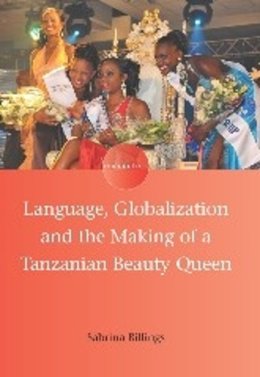
Language, Globalization and the Making of a Tanzanian Beauty Queen
Sabrina Billings
Through micro-analysis of language use, this book chronicles young women's pathways to becoming a Tanzanian beauty queen, offering an original perspective on the intersection of language with globalization, nationalism, and inequality in urban East Africa. This compelling linguistic ethnography considers the real-life effects, both on- and off-stage, of language policy, education, and gender dynamics for the women competing in the pageants. While highlighting many contestants' struggles for escape from poverty and patriarchy, the book also emphasizes their creative strategies – linguistic and otherwise – for bettering their lives and shows how people living in a global economic periphery take part in, and sometimes feel left out of, the wider world.
Product Details
About Sabrina Billings
Reviews for Language, Globalization and the Making of a Tanzanian Beauty Queen
Niko Besnier, University of Amsterdam, The Netherlands Sabrina Billings' book speaks beautifully to young Tanzanian women's aspirations for cosmopolitan ascent through the global beauty pageant pyramid, contrasting their specifically gendered lot in national sociolinguistic hierarchies. Beauty pageants thus provide the lens through which we can clearly see the enabling and constraining effects of local varieties of English, of Swahili, and of Tanzania's numerous ethnic languages.
Michael Silverstein, University of Chicago, USA This elegant ethnography makes vivid the role of speech as a measure of beauty in multiethnic Tanzania. Through a lucid discussion of the ways in which aspiring beauty queens are evaluated in national imaginaries, Sabrina Billings shows how speech behaviors are read as emblems of the gender, race, and ethnicity of women aspiring to become national icons of Tanzanian womanhood.
Asif Agha, University of Pennsylvania, USA It is an excellent book, a coherent and well structured ethnography punctuated with many outstanding arguments, with reach across and between several disciplines. In a very simple way, though, it is the ‘accessibility’ and ‘clarity’ of this book that is its greatest strength, and the expert balance between the professional, or the academic, and the personal. Overall, this book is an excellent micro-analysis of language in and around Tanzanian beauty pageants, revealing the links and conflicts between discourses of structural inequality, education, urbanisation and urbanity, gender relations, and the divides between cosmopolitan centres and the global periphery. It is a pleasure to read, both for its content and for the quality of the writing, and should be read and enjoyed by many.
Joseph V Comer, Royal Melbourne Institute of Technology University, Australia
on the LINGUIST List 26.1085
